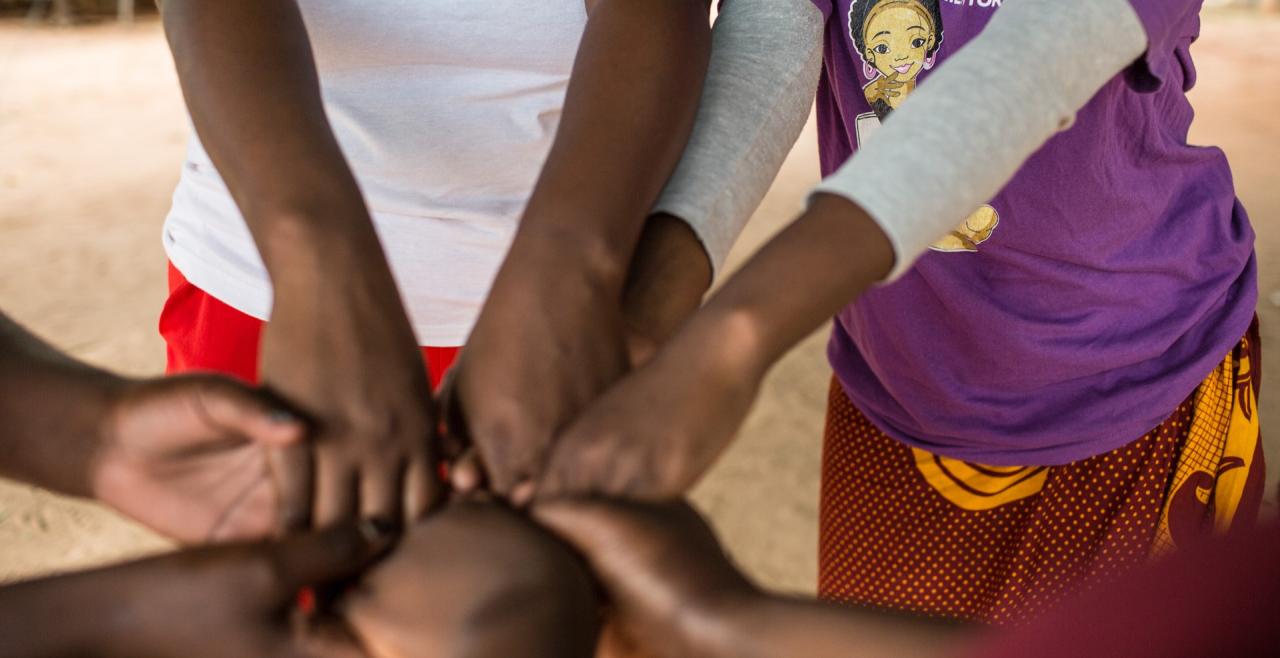Community activists are on a mission to end child marriage in Mozambique

CHICUALACUALA, Mozambique - Selma* was 17 when her mother told her that another family was expecting her as a bride in Gaza Province, southern Mozambique. The deal was done. Selma joined her new family and became pregnant shortly after.
One day, Selma received a visit from community activists, Maria* and Francisco*, who work for Kutenga, a Spotlight Initiative-supported organization. They had received reports of child marriage, including Selma’s, while raising awareness about gender-based violence in nearby communities.
They decided to act, but never imagined how hard it would be.
“The husband’s family did not want to let Selma go because she helped with domestic chores” – Francisco, community activist
“We talked to the husband’s family and to local leaders about the law against unions with minors [those under 18 years old] and reported the case to the police,” says Maria. The community activists also explained the devastating impact this marriage could have in Selma’s life, from exposing her to violence and health risks to compromising her future and dreams.
According to global UNFPA data, child marriage is often followed by pregnancy, even when a girl is not yet physically or mentally ready. Mozambique is no exception. According to the 2017 Population Census, 56 per cent of 17-year-old girls who are married have children. In developing countries, complications from pregnancy and childbirth are the leading cause of death among adolescent girls aged 15 to 19. Furthermore, it is known that marrying before the age of 18 increases the chance of intimate partner violence by twenty-two per cent.
The COVID-19 pandemic has worsened inequalities between men and women and exacerbated some of the main drivers of child marriage, such as limited access to education, early pregnancies and poverty. Reports from around the world show an alarming increase in all forms of violence against women and girls, including child marriage, in these unprecedented times.
“We met a lot of resistance,” says Francisco. Nonetheless, the activists persuaded the husband’s family to return Selma to her parents. The activists also promised to visit soon after to ensure Selma had actually returned.
A week later, the activists were encouraged to find Selma at her parents’ home. However, shortly after the visit, neighbours reported she had only come for the day and had already gone back to her husband’s home.
“Selma’s parents have understood the importance of fighting child marriage and now help us inform other families” – Francisco, community activist
UNDERSTANDING GIRLS’ RIGHTS
“[The husband’s family] did not want to let [Selma] go, because she helped with domestic chores,” says Francisco. At the same time, Selma’s family was reluctant to take her back.
Both families and local leaders were summoned to the police station. “When interrogated, it became clear that none of them knew that marrying a girl under 18 is illegal,” says Maria.
This is why the activists’ work in educating communities about human rights and the laws protecting women and girls from violence and harmful practices like child marriage is so important.
At last, the families understood they had violated Selma’s rights and decided to do the right thing: cancel the marriage.
Selma returned to her parents’ home, and the police closed the case.
She is happy to be back home. “We visit her often. She is well supported by her family,” says Francisco. The husband’s family agreed to support her and the baby financially, and she is receiving counselling from the social protection services. Selma is also learning the skills to develop her own business, through a Spotlight Initiative-supported intervention on women’s economic empowerment.
“Selma’s parents have understood the importance of fighting child marriage and now help us inform other families,” he added.
CHANGING BEHAVIOUR
In 2019, the Mozambican Parliament approved a new law criminalizing unions with minors (those under 18 years of age). This was the culmination of years of efforts by the Government, civil society and rights-based organizations, concerned that almost half of girls in Mozambique marry before 18 – one of the highest child marriage rates in the world.
Under the leadership of the Ministry of Gender, Child and Social Action, the programme is working collaboratively with public institutions and civil society to make this law known to communities across the country.
One of the key groups targeted are local leaders. They act as guardians of social norms and are powerful allies in deconstructing harmful practices in their communities.
In 2020, Spotlight Initiative-supported interventions have educated over 300 local leaders on the new law, driving behaviour change which has led to 11 child brides having their marriages cancelled.
*names have been changed
Kutenga is a civil society organization that educates communities to prevent gender-based violence in Xai Xai, Chongoene and Chicualacuala Districts in Gaza Province. It is part of the Consortium Against Sexual Violence, a partnership of seven women’s organizations working to prevent sexual and gender-based violence under the Spotlight Initiative in Mozambique.
By Aníbal Cossa and Leonor Costa Neves
